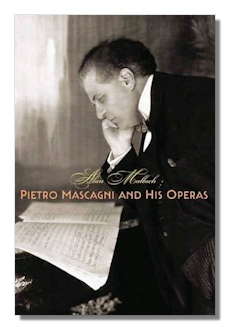
The Internet's Premier Classical Music Source
Related Links
-
Introduction
Acoustics
Ballet
Biographies
Chamber Music
Composers & Composition
Conducting
Criticism & Commentary
Discographies & CD Guides
Fiction
History
Humor
Illustrations & Photos
Instrumental
Lieder
Music Appreciation
Music Education
Music Industry
Music and the Mind
Opera
Orchestration
Reference Works
Scores
Thematic Indices
Theory & Analysis
Vocal Technique
Search Amazon
Recommended Links
Site News
 Book Review
Book Review
Pietro Mascagni and His Operas

Alan Mallach
Northeastern University Press, 2002
ISBN-10: 1555535240
ISBN-13: 978-1555535247
To most opera lovers, Pietro Mascagni was a classic "one work" composer, known mainly (or only) for Cavalleria Rusticana. Mascagni wrote the opera for a contest (that he won) when he was 26 and in need of funds. The opera took audiences by storm and launched its composer into world stardom. Cavalleria was a phenomenon. Its tale of jealousy, vengeance and murder in a Sicilian village and its bold, passionate music helped introduce a style known as verismo that soon became the rage. The opera made its composer wealthy and crowned him as the successor to Italy's beloved Giuseppe Verdi. It also put the burden of expectation upon Mascagni's shoulders. What would be the maestro's next great achievement?
As it turned out, the rage of Cavalleria was never matched by any of the 14 operas that followed, though several were successes in their own right. One reason may have been that Mascagni did not just find a formula and stick with it. Just as Cavalleria was a new idea or style for him, so were most of the operas that followed it. His love of experimentation made for a fascinating and varied output, but it may not have served him well with a public who was less enamored of innovation than he was. Nor did it give him time to work with a style long enough to master it. (It remained for Giacomo Puccini to find his niche within verismo and become its leading proponent.)
Mascagni was born into the workingman's city of Livorno. His father had little use for his musical ambitions, and the young man struggled until Cavalleria. He was a passionate man with many friends, given to explosions of ecstasy and long periods of discouragement. He married once and was no philanderer, but the love of his life was longtime mistress, Anna Lolli. Even so, the composer was devoted to his family and supported them in his later years. He could be a staunch friend who would work himself to exhaustion to ensure that musicians on tour could buy a ticket home, but he did not shrink from conflict with publishers ill serving him, shirking librettists, or friends who betrayed him.
Late in life, after Mussolini came to power and for reasons not entirely clear, Mascagni moved to Vienna, where he enjoyed success conducting the Vienna State Opera. After a while, this most Italian of Italians longed to return home but feared retribution because he had poked fun at the Fascist regime. He need not have worried. Mussolini knew what the man still viewed as Italy's maestro could contribute to the regime and welcomed the composer back with enthusiasm. Mascagni in turn was seduced by Il Duce's persona and became a tool of the regime. As a result, a lingering reputation as a Fascist dogged him to the present day. What made this so sad was that Mascagni's politics were more personal than political. He had spoken for socialism out of sympathy for workers, against Italy's entry into the Great War because of the impending pain and carnage, and for Fascism out of admiration for its boss and love of Italy, not because he was a Fascist. (Puccini was a true believer, but his reputation suffered little if at all. Of course Puccini never posed for a publicity photo at the Exposition of the Fascist Revolution in Rome looking ridiculous – as Mascagni admitted he did – sporting a rifle on his shoulder and wearing Fascist Black.) Mascagni died a somewhat unhappy man, his wife senile, and his sons lost to war or Fascism. (His daughter was still alive.) For all his innovation, Mascagni had been deemed passe by many in Italy's musical establishment. Even so, for most of his life, this "one opera" composer was a major force in Italy's musical life, both as a composer and a conductor.
Pietro Mascagni and his Operas is one of the few sources on Mascagni in English or any language, and the first full biography in English. It is as much about opera as about Mascagni, and it fills a gap between Verdi and Puccini. The author describes the creative work that went into each opera, the stories behind the productions, and the critical and audience reaction. Mallach's writing is succinct, but colorful, like that of a fine reporter. Working with primary sources like Mascagni's 4200 letters that Anna Lolli preserved in a small library in Italy, he tells a good story and stays close to his subject. We don't learn a great deal about composers like Puccini, Cilea, etc., but what we see through Mascagni's eyes reveals a great deal about opera, Italy, and politics.
Mallach's devotion to the composer does not cloud his evaluations of the man and the music he wrote. He understands history's neglect of Mascagni's post-Cavalleria operas and explains it musically and historically, though it is clear that he wishes the verdict were otherwise, as do I. Of course, there is no substitute for hearing those operas, and that is not easy to do because of the paucity of recordings and the less than stellar sound quality of many. Mallach helps with an annotated discography. I've heard most of the recordings of the more obscure operas, and generally agree with Mallach on most of them. Anyone interested in opera should find this book a fine introduction to some wonderful music and a fascinating tale about one of opera's more colorful but puzzling figures.
Copyright © 2008 by Roger Hecht.


















